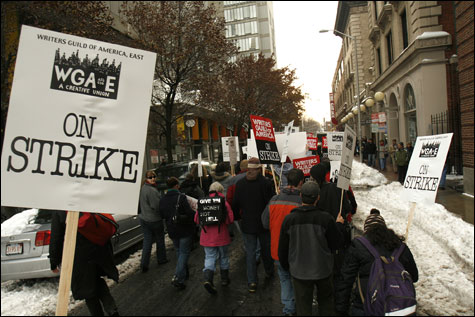
FAN BASE: The writers say they want only 2.5 percent — and real dragons. |
Besides being a labor guy, Mr. Film Culture wanted to check out Boston’s first rally supporting the Writers Guild of America strike to see which New England–based screenwriters would answer the call. I’ll admit to being disappointed when I arrived December 14 at the First Unitarian Church in Cambridge: the speakers on the podium were all TV writers. Credit Cambridge’s Jamie Paglia of Eureka fame on the Sci Fi Channel for organizing the event. He imported from New York Rob Kutner, an Emmy Award–winning writer for The Daily Show and, most important for many in attendance, Joss Whedon, creator/writer of Buffy the Vampire Slayer.
What was far more of a jolt was the identity of the hundreds in the church pews. A storm of angry Guild activists? A show of hands revealed fewer than a dozen Guild members in the house. Instead, the church swarmed with late-teenage fan boys and girls who were there in solidarity with Whedon, their fantasy-writer superhero. Whatever he said made them chortle, so his stump speech proved an uncomfortable mix of union agitprop and pop-culture pandering.
Whedon said, with a straight face, that there are two major issues on the bargaining table, as the Guild (the WGA) faces off against the Alliance of Motion Picture and Television Producers (the AMPTP). “Number one: new media, the Internet, iPhones, etc. The people who created it should get a piece of it. Number two: DRAGONS SHOULD BE REAL!”
Mother Jones, Saul Alinsky, Walter Reuther. . . . Joss Whedon. He actually said, “Number two.” The crowd roared, so he added, “We’re reasonable people. They need three years to study dragon technology. We took it off the table.” Then Whedon looked out at his youthful admirers. “This strike has created a community, between us and you. The audience has a voice. You guys are that voice. . . . Go into iTunes, make a statement about this. You can start a virtual picket line!”
Rob Kutner explained the actual bargaining point concerning New Media. “We are asking 2.5 percent. They say our demand is shocking, it will destroy Hollywood.”
Jamie Paglia told the audience to check out www.unitedhollywood.com, where executive Sumner Redstone is lecturing about the huge profits possible from the Net. This is the same Redstone whose Viacom offices are being picketed by the WGA.
The meeting ended, and those in attendance, including the non-WGA fans, were invited to march through Harvard Yard with picket signs, then rally again at the Harvard Lampoon. As the crowd exited, I raced up to actual local WGA members to see who they were. These included Somerville’s Marc Weinberg, who has worked for the USA Network and A&E, Newton’s Larry Ramin, who has written for The Gathering Storm, and Christina Covino, an ex-writer for All My Children and As the World Turns.
And there was my friend novelist Tom Perrotta (Election, The Abstinence Teacher), who is a bona fide Hollywood scriptwriter, Oscar-nominated for co-writing the screenplay from his novel Little Children. Perrotta is an avid supporter of the strike. “When I write a book, I get a royalty between seven and 15 percent. For new media, the Writers Guild is asking for only 2.5 percent. The producers are talking something like .5 percent. For the writers, the deal is an insult. Right now, about eight cents goes to the writer on a $30 DVD. The strike is not something we can lose — it’s a matter of survival. The studios are fooling themselves if they think there’ll be an erosion of support.
Before the strike, Perrotta was working with The Little Miss Sunshine filmmakers Jonathan Dayton and Valerie Faris on a screen adaptation of The Abstinence Teacher. “We were two drafts in,” he said. “Now, we’re in limbo. No writing.”